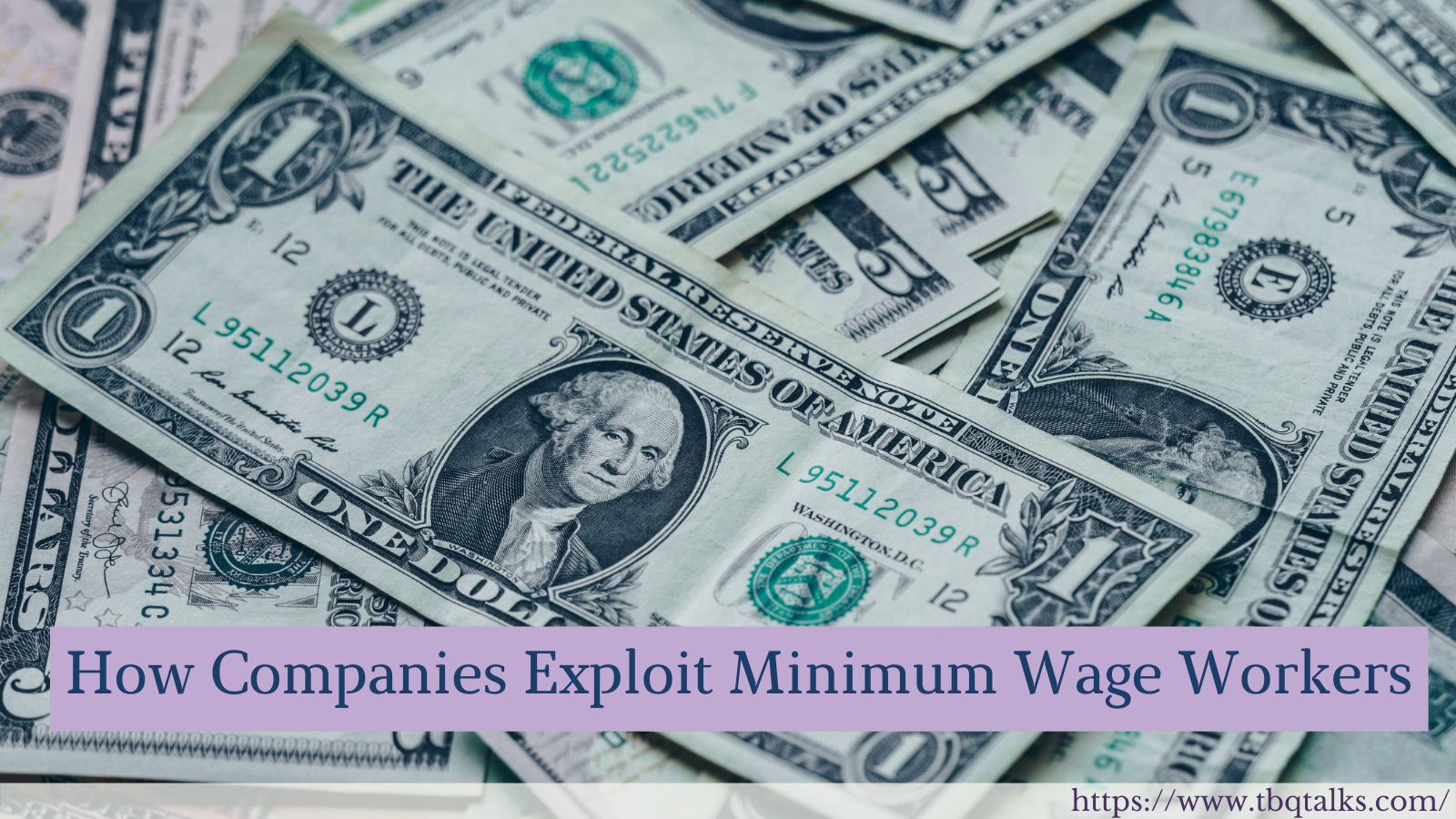How Companies Exploit Minimum Wage Workers
One of the many calculated ways companies demand more work from minimum wage employees while paying them less to do it.

From a tweet thread originally posted on January 17, 2021
Another part of the $15 minimum wage to consider is that not only has cost of living gone up, but the amount of work being asked of hourly employees has also increased. Allow me to talk about how corporate methodically abuses its employees for cost savings.
In any situation where you have multiple locations of hourly workers which rolls up to a Corporate office - such as the mythical fast food restaurant which will suddenly charge $80 for burgers if wages increase - you have people with spreadsheets analyzing cost and income.
Income is obvious: what people pay to the company. Cost covers everything the company pays to run the business.
Some costs they can't control, like rent on locations. Others they can. Switch the breakfast sandwich from real eggs to powdered eggs and that's an immediate savings. Buy cheaper napkins to put into the dispensers, another immediate savings.
But then you have human cost. You need employees. What's the version of a cheaper napkin for an employee?
Enter Productivity. Productivity is how much work a person can get done in a set amount of time. Somebody who flips 15 burgers in 5 minutes is more productive than somebody who flips 5 burgers in 5 minutes.
Remember those math problems about how Bob could mow a lawn in an hour and Bill could do it in an hour and a half? Welcome to those calculations now writ large, and about EVERYTHING. Burger flipping, napkin dispenser refills, counter wiping: EVERYTHING gets analyzed.
A big company has enough data to crunch every possible number and come up with what is an average productivity. From there they determine staffing.
Let's say the average productivity for burger flipping is that one person can flip 100 burgers an hour. If the lunch rush consistently brings 200 burger orders, you need two people working to flip those burgers.
Ideally this is used to create reasonable staffing demands: we get 200 burger orders at lunch, so 2 people need to work. We get 500 burger orders at dinner, so 5 people need to work. Multiply those shifts by minimum wage and there's the answer for employee cost.*
(* We're ignoring other expenses like healthcare for the sake of keeping things simple. Also AHAHAHAHAHA at the idea that this place would be giving its hourly employees good healthcare anyway.)
Ideally this is where the conversation ends: Here's the work need, here's the people to fill it, here's what you pay them. But corporate doesn't like that. One, because it wants those cheaper napkin savings wherever possible.
And two, what about at 3am when only 2 burger orders come in? There's no option for a fraction of a human to be working. You have to have a person and that person has to be paid the minimum wage no matter what their productivity is. 100 burgers or 2 burgers, same hourly rate.
Corporate doesn't like this. Paying someone the same for 100 burgers or 2 makes the profit numbers go all screwy. We're not getting the clean, across the board savings that buying cheaper napkins gives us. By god we're basically throwing money away!
So Corporate goes back to the productivity numbers and tweaks those. They're stuck with having to have one full employee working that 3am shift. But during the lunch rush? Well who says it has to be 100 burgers per employee?
Because here's the thing about that minimum wage: They have to pay the employee being asked to make 2 burgers in an hour the same as the employee making 100 burgers in an hour. But that's also the same as 150 burgers, 200 burgers, and so on.
So they can't get rid of the person working at 3am but they CAN increase productivity demands during the busier shifts. Back to Bob and Bill: If 200 burgers need to be made and Bob makes all of them, then why is Bill here? Boom! One whole employee's worth of money saved.
This also allows for fine tuning adjustments. If Bob's best is 150 burgers then we only need Bill to make 50. Bill only comes in long enough to make those 50 and then is sent home. Bill makes less money accordingly and our profits still increase.
(Anyone who has worked an hourly job is now nodding along and thinking of every schedule they've been given with weird truncated shifts, and far too few people working for the demands of the job in that time.)
Of course this ignores how the original productivity calculations were based on the more realistic scenario. We're not considering that humans can only work top speed for so long, or what happens if someone needs to clean up a soda spill during the lunch rush.
And ignoring that reality is why the number always gets dialed down. Bob's making 150 burgers, so surely he can make 160 right? Then 170? Then 180? And so on.
So it is ridiculous to say that raising the minimum wage will make companies get rid of hourly employees to "save costs." THEY DO THAT NOW. They do it because they can! Because nobody is stopping them from asking Bob to make a thousand burgers an hour!
You know where the weird truncated "We only need you for a half hour" type shifts don't happen? Places like California which have stricter laws about things like the minimum you can ask an employee to work and when you have to pay them overtime.
And when companies are legally required to take this into consideration, miraculously they find a way to do it! Oh they bitch and complain about it and try to back politicians who will change the laws in their favor, no mistake. But they still comply with the law.
There is basically no scenario where companies like these are going to voluntarily start paying their hourly employees more for the same amount of work. Because right now they are finding ways to pay them less for more work.
Because remember the flip side: When Bob made 100 burgers per hour, he got 2 hours worth of wages for making 200 burgers. But if he's told he has to make 200 burgers an hour now... well that second hour of wages is gone. Twice the work for half the pay.
(Which again is a simplified example. More typically Bob's being asked to make more burgers AND work the register AND clean the soda spills AND refill the dispensers and any number of tasks that were done by employees who aren't there anymore.)
I mean the minimum wage should be raised because it fucking should be. It doesn't equal what it's supposed to because of inflation and that should be the end of the discussion.
But me being me I had to speak up about this idea of how somehow Corporate cares SO MUCH about hourly employees and would be OH SO SAD to have to get rid of some if the mean ol' minimum wage hikers MADE them do it.
I can assure you FROM HAVING SAT IN THESE MEETINGS** that Corporate will cheerfully get rid of an employee if it means improving a profit calculation at a thousandth of a decimal point.
And said profit goes directly to the C-suite execs who give zero fucks that they just put someone and their family on welfare. The only thing that stops these assholes is when the law forces them to.
They'll abuse their employees regardless. They'll lay off people regardless. The only thing a minimum wage hike does is give slightly fairer wages for the ridiculous amount of work being asked, and allow people to actually have enough money for their own food and rent.
(**And to be clear, I was in those meetings trying to argue against this mindset. I didn't get far, but I tried)

